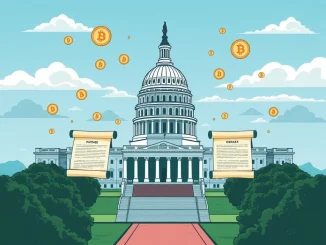
The promising world of real-world assets (RWAs) is currently grappling with a significant challenge as RealT Inc., a prominent RWA issuer, faces a staggering $2.72 million RealT lawsuit. These legal battles stem from grave allegations of fraudulent practices within its tokenized Detroit property offerings, sending ripples of concern throughout the entire RWA ecosystem. For anyone invested in or considering the burgeoning RWA market, understanding the implications of this case is paramount, as it directly impacts the perceived RWA market viability and the future of digital asset integration with traditional finance.
RealT Lawsuit: Unpacking Allegations of Tokenized Real Estate Fraud
RealT Inc., a Florida-based real-world asset (RWA) issuer, is under intense legal scrutiny following accusations of fraudulent activities in its tokenized Detroit property ventures. The core of the RealT lawsuit revolves around claims that the company sold shares in 39 homes it did not legally own, allegedly defrauding investors of $2.72 million. This figure is more than double the combined market value of the properties involved, painting a grim picture for affected investors.
The allegations extend beyond simple ownership issues. RealT is accused of:
- Failing to disclose critical risks such as high vacancy rates.
- Omitting information about property depreciation.
- Neglecting to inform investors about regulatory violations across 408 properties under its management.
These severe accusations have ignited widespread concern regarding the viability and integrity of the broader RWA market, where blockchain-based tokenization aims to democratize access to illiquid assets like real estate. Investors argue that RealT sold tokens without proper disclosures about the absence of traditional real estate protections, including insurance, maintenance oversight, and tenant rights. One lawsuit specifically highlights the lack of third-party audits, unclear revenue distribution mechanisms, and opaque property management processes as systemic flaws exposing investors to significant losses.
Why RealT’s Woes Cast a Shadow on RWA Market Viability
The RealT scandal is more than just a company-specific issue; it’s a litmus test for overall RWA market viability. The very premise of tokenized real estate is to offer fractional ownership and enhanced liquidity, but the RealT case exposes a stark disconnect between this promise and the reality of execution. Critics warn that unregulated platforms like RealT are exploiting a lack of standardized frameworks, creating fertile ground for misrepresentation and potentially Ponzi-like schemes. An anonymous investor described the situation as a “Ponzi/Madoff-type scheme,” vowing to withdraw all funds, while industry analysts note that 20 similar cases of token sales without clear ownership further erode trust.
The scale of the alleged fraud, combined with high vacancy rates and properties located in economically distressed neighborhoods, underscores the critical challenges when blockchain-based investment models intersect with the complexities of real estate management. The lack of robust safeguards and transparent operations in the RWA sector has become a glaring concern.
The Perils of Unregulated Blockchain Real Estate
The RealT case highlights significant regulatory gaps within the burgeoning blockchain real estate sector. While blockchain technology offers innovative solutions for asset fractionalization and liquidity, the absence of comprehensive oversight can lead to severe consequences for investors. RealT’s business model—purchasing Detroit properties, tokenizing them, and marketing fractional shares for passive income—has come under fire for its failure to ensure transparency and due diligence.
Beyond investor claims, RealT’s legal challenges extend to Detroit authorities, who have filed suits over code and tax violations on 408 properties managed by the company. These violations, coupled with the alleged sale of unowned assets, raise serious questions about the scalability and ethical standards of RWA platforms, especially in regions with high default rates or unstable local economies. This situation underscores the urgent need for a more structured and regulated environment for tokenized assets.
Navigating the Future: Digital Asset Regulation and Investor Protection
The outcome of the RealT lawsuit could set a crucial precedent for how regulators approach tokenized assets, which are often classified as unregistered securities under existing frameworks. If courts rule that RealT’s tokens should be treated as securities, it could trigger significant compliance overhauls across the entire sector. Conversely, a favorable ruling might embolden other platforms to operate in regulatory gray areas, potentially increasing risks for investors.
A securities law expert emphasized the urgent need for “robust due diligence, clear disclosure requirements, and regulatory clarity” to prevent the RWA market from becoming a “Wild West scenario.” This call to action resonates deeply within the industry, as stakeholders scrutinize whether tokenized real estate can truly fulfill its promise of democratizing access to investments without compromising integrity. As regulatory bodies like the SEC and FINRA review federal guidelines for tokenized assets, the sector’s long-term viability may depend on balancing innovation with rigorous oversight to restore investor confidence and ensure proper digital asset regulation.
The RealT case serves as a stark reminder that while blockchain technology offers revolutionary potential for asset tokenization, it must be coupled with robust legal frameworks, transparent operations, and stringent investor protections. The future success of the RWA market hinges on its ability to evolve beyond a regulatory gray area into a mature, trustworthy investment landscape where innovation and integrity go hand in hand.
Frequently Asked Questions (FAQs)
What is the RealT lawsuit about?
The RealT lawsuit alleges that RealT Inc. engaged in fraudulent practices by selling tokenized shares in 39 Detroit properties it did not legally own, defrauding investors of $2.72 million. The lawsuit also claims RealT failed to disclose critical risks like vacancies, property depreciation, and regulatory violations across hundreds of properties.
How does the RealT case impact RWA market viability?
The RealT case significantly impacts RWA market viability by exposing a lack of robust safeguards and transparency in some tokenized asset offerings. It raises concerns about regulatory gaps, potential for misrepresentation, and the need for stronger investor protections, which could affect investor confidence and future growth in the sector.
What is tokenized real estate fraud?
Tokenized real estate fraud involves deceptive practices in the tokenization of property, such as selling fractional shares of properties that are not legally owned, misrepresenting property values, or failing to disclose significant risks like high vacancy rates, maintenance issues, or regulatory violations.
What are the regulatory implications for digital asset regulation from this case?
The RealT case could set a precedent for how regulators classify and oversee tokenized assets, particularly if the courts rule that RealT’s tokens are unregistered securities. This could lead to increased scrutiny, stricter compliance requirements, and the development of clearer digital asset regulation frameworks by bodies like the SEC and FINRA, pushing the industry towards greater transparency and accountability.
What should investors consider before investing in blockchain real estate?
Investors interested in blockchain real estate should prioritize platforms with robust due diligence processes, clear disclosure requirements regarding ownership, property status, and risks. Look for evidence of independent audits, transparent property management, and adherence to existing legal and regulatory frameworks to mitigate risks.



